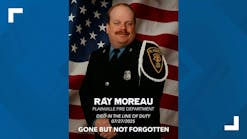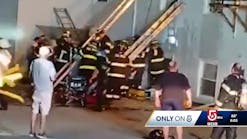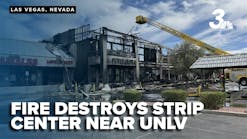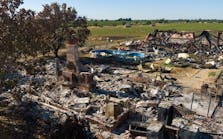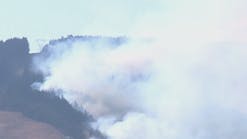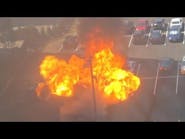NEW ORLEANS (AP) -- Above the din, a woman is screaming the Lord's Prayer as if heaven can no longer hear silent pleas.
''And lead us not into temptation,'' she bellows hoarsely to the unhearing throng, ''but deliver us from evil ...''
But temptation is everywhere in this crippled city. And so, it seems, is evil.
Five days after Hurricane Katrina came and went, necessity has forced police officers to become looters. Gangs hijack the boats of volunteers who have come to rescue them. Naked babies wail for food as men get drunk on stolen liquor.
A walk through New Orleans is a walk through hell _ punctuated, it must be said, by moments of grace.
Along the debris-choked Mississippi River, pharmacist Jason Dove watches as people scramble in the parking lot of the downtown convention center for cases of airlifted water and shakes his head. ''We created this Frankenstein,'' he says. ''It's showing how fragile this society is.''
In the world-renowned French Quarter, armed residents hide behind ornate iron gates like prisoners in a frilly jail. Historic markers on Napoleonic-era houses share billing with signs that warn: ''You loot, we shoot!''
When water began rising in predominantly black neighborhoods, many jumped to the conclusion that the levee had been purposely breached to preserve the old city and its hotels.
''F... the Quarter!'' a black man shouts as he walks beneath a balcony where a resident lounges with a cold beer as generator roars away in the otherwise deathly night silence. ''They always protect the Quarter.''
Katrina's winds have left behind an information vacuum. And that vacuum has been filled by rumor. There is nothing to correct wild reports that armed gangs have taken over the convention center. That two babies had their throats slit in the night. That a 7-year-old girl was raped and killed at the Superdome.
One officer calls these human cattle yards ''lawless countries unto themselves.''
After several days in the street with little water and less food, people around the convention center began imagining that the storm was somehow a vehicle for ethnic cleansing. One black man insists that authorities want everyone corralled into the convention center _ not to facilitate an orderly evacuation, but so police can ignite the gas and blow them up.
''They want us all crazy so they can shoot us down like dogs!'' a woman shouts.
Police point their guns at the crowds and tell them to back off. The people take it as aggression. But when you look into these officers' eyes, there is real fear.
Officer Kirk LeBranche cowered on the roof of his flooded hotel in New Orleans East for three days as the nighttime hours became a shooting gallery.
''Anarchy and chaos,'' he says. ''People are desperate.''
Officers deserted their posts. Many of them lost everything but their lives to the storm, and they refuse to gamble those on a seemingly lost city.
Katrina has not just robbed people of their homes. It has taken their dignity.
On a sidewalk crowded with children and the elderly, a woman pulls down her pants and squats behind a potted plant. A passing man averts his eyes.
''Thank you,'' she says. ''I'm just doing what I've got to do.''
At the convention center, where thousands have camped in the streets since Monday awaiting buses out of the city, the despair feeds on itself like a voracious beast.
When National Guard helicopters attempt to land supplies in the parking lot, waiter Bob Vineyard joins a self-appointed ground crew attempting to set up a safe perimeter. The crowd surges past them with an almost feral intensity, and the chopper crew is forced to take off.
The soldiers drop cases of water and self-heating meals from 10 feet in the air. Many of the bottles burst on impact, the precious water left to evaporate in the hot sun.
''We would have had a whole helicopter full of food if you had stayed back!'' Vineyard shouts at the crowd, with disgust. ''Hey, y'all. I did my best.''
Carl Davis wonders why someone can't just truck the food in and hand it out in an orderly fashion. Rather than taking comfort in the food drops, he finds the process insulting, demeaning.
''They're giving it to us like we're in the Third World,'' he spits. ''This should never have happened. It didn't happen in Iraq, and it didn't happen in the tsunami.''
Down the street, anxious tourists idle on a bandstand across from Harrah's casino, which has become a National Guard and police staging area. Jill Johnson of Saskatchewan says police don't want them there, but she and others worry they would be easy prey at the convention center.
''We're appalled,'' says Johnson, who tried to buy a car to get out of town. ''This city is built on tourists, and we're their last priority.''
Nearby, Cassandra Robinson huddles in the loading area of a local store where a small community has formed. Her niece, Heavenly, who turned 1 year old the day before the storm, dozes in Robinson's arms, weakened by a diet of water and mashed-up potato chips.
Robinson says people are behaving like animals because they are being treated as animals.
''We're not born thieves,'' she says, as neighbors heat food over a trash-can fire. ''We were born Christians.''
Thursday night, a prayer session begins at one end of Convention Center Boulevard and spreads to the other. Please, they implore, let there be no more rioting.
The next morning, someone _ Robinson does not know who _ appears with fresh, cold milk. And instead of fighting over it, able-bodied adults step back and allow the children and the elderly to be nourished first.
Across the city, people have banded together, creating pockets of civility amid the chaos.
The management of the French Quarter's Hotel Le Richelieu fled two days after the storm. Those left behind _ cooks, maids and security officers _ organized to ration supplies, establish foraging teams and set up a schedule for guard duty.
Days after the storm, the kitchen somehow manages to keep serving hot food. Guests have taken to calling the place the Hotel Rwanda.
''It's a jungle and it's dog-eat-dog,'' hotel security guard Glenn King says as he rests his hand on the butt of a revolver at his side. ''When you see the police doing the same thing the looters are doing, it tells me you're going to have to fend for yourself.''
Some find ways to flee. New Orleans resident Robert Jordan and eight family members are on their way to Birmingham, Ala., but he delays his departure more than two hours to help plug a fellow refugee's punctured tires. He uses goods he ''borrowed'' from a nearby auto parts store.
''Bye-bye, French Quarter!'' he shouts as his three-vehicle caravan leaves the protective walls of the Richelieu parking lot. ''Be safe.''
But Jordan's sentiments seem wishful thinking.
Before dawn Friday, the French Quarter is rocked by explosions. A few miles down river, railroad tanker cars erupt in a tornado of flame, showering a flooded neighborhood with soot and casting a pall of black over the city _ as if New Orleans isn't already under one.
A police officer says snipers fired on workers sent in to fight the fire. They stood down and watched it burn.
Randall Davis walks from his home in the French Quarter and sits on a bench, staring at the inferno through reddened eyes, his head swimming with apocalyptic thoughts.
''It's becoming less numbing each day,'' he says, as the fire rages. ''It's unfortunate that I'm getting used to anarchy and chaos when this was once a vital, vibrant community of people who looked out for one another. And it's degraded to this.''
Davis laughed when he heard a congressman suggest that the city should be abandoned to the swamp waters from which it was born. But he isn't smiling as he stares into the smoke-shrouded sunrise.
''If this is what it's like when we even have a semblance of society,'' he says with a sigh, ''maybe we shouldn't build it back.''
Copyright 2005 Associated Press
